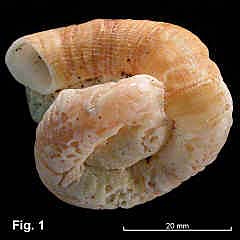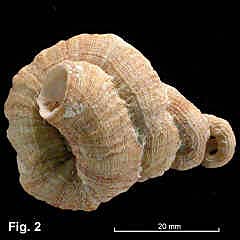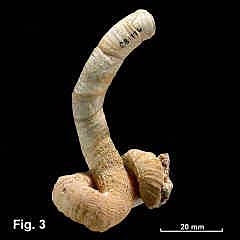|
|
|
|
|
Serpulorbis sipho (Lamarck, 1818) Description: Shell irregularly coiled, at least early whorls attached to substrate. Surface irregular, sculptured with longitudinal threads and growth ridges; sometimes smooth on last centimetre or so. Interior smooth. Operculum absent. Colour white, fawn or brown. Size: Tube diameter at aperture 4-10 mm. Distribution: Endemic to Australia; NSW, around southern Australia, to at least south-western WA. Habitat: Around Sydney, this is uncommonly found in the subtidal, fixed to solid substrates; shells are occasionally washed up on beaches. Macpherson (1966) gave the habitat of this species in Port Phillip Bay as "common on rock platforms particularly where the finer sediments and dense weed growth provide the fine particles of organic matter on which it feeds". Comparison: S. sipho has tube diameter of 4-10 mm, much larger than Petalconchus caperatus, with tube diameter of 1 mm. Synonymy: Numerous names were used in the 19th century literature, as discussed by Hedley (1903, p.602). Several authors have used the name Bivonia constrictor Mörch, 1862 for shells from around Sydney. Remarks: The species was studied at Rottnest Island, WA, by Hughes (1993), who figured the animal and radula. Fig. 1: Hyams Beach, Jervis Bay, NSW (DLB4096) Fig. 2: Balmoral Beach, Middle Harbour, Sydney (C.091067) Fig. 3: Port Jackson, Sydney (C.081776) |


